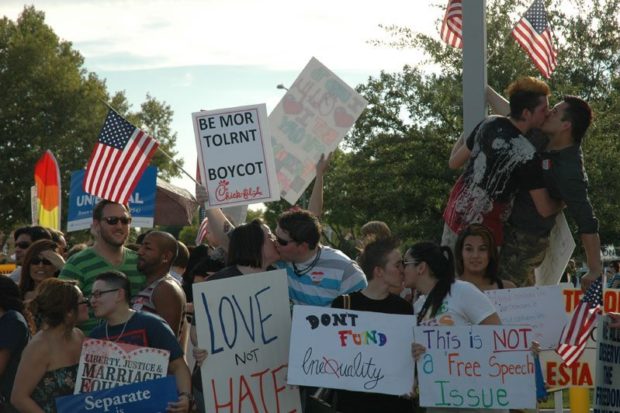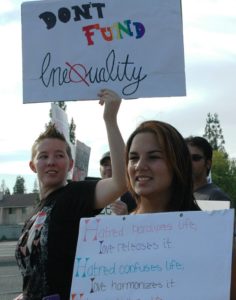
By Kaylia Metcalfe
“One two three four, we won’t take it anymore!”
“Gay Straight, Black White, Same Issues Same Fight!”

Over the years, I have attended many rallies, public display protests, sit-ins, demonstrations and instances of activist civil disobedience. I have been interviewed and photographed by the press (radio, television and newspapers). I have been yelled at by the public and by cops. I have had things thrown at me, been insulted and been spit on.
And without fail, someone always comes up to me either during the activity or in the next week and asks me why I bother. What’s the point?
Which are two very different things, but the answer to both questions boils down to “because I care enough to do something.”
Why I bother: I protest, attend rallies and willingly join in a community of like-minded upset individuals because I think it is important to do so. Because it can be fun. Because it can be comforting to see others who feel the same way. Because sometimes it works.
And that gets into the point—and in many cases that is the point. For most of the rallies and protests I have taken part in, the point is a combination of heightened awareness and call to action. Sometimes it is about education and team building. Sometimes the point is exposure, sometimes the point is simply to show that people care. And sometimes the point is to have an outlet for frustration, a way of feeling like you have done something, even if that something was just to be reminded that you are not alone.
And while public display protesting can be an important, some would say paramount, part of community building and exposure of the issues, sometimes we don’t take part. Sometimes we want to hang back and wait. Sometimes our brain or our heart tells us we don’t really have any control, that being visible and vocal won’t make a difference but might be counterproductive. Sometimes we are out of town or can’t afford to take time off work. Sometimes we are afraid.
Which is all understandable. But ultimately moot, because while it is true that making a scene can be a powerful tool, having a huge swell of support from our community alongside our straight allies can be a powerful tool, fighting fire with fire in terms of bodies showing up for or against something can be a powerful tool.
Those things aren’t the only tools in our tool box, and sometimes it is okay to remember that.
Because, despite the reputations and the often heard exclamations of the organizers, there is more than one way to protest, and while public displays, sit-ins, rallies and picketing are all good ways to protest, they aren’t the only way.
 We can protest by spreading information and educating our own community and the community at large: handing out fliers, posting on forums, e-mailing, talking, writing articles, working at a phone bank.
We can protest by spreading information and educating our own community and the community at large: handing out fliers, posting on forums, e-mailing, talking, writing articles, working at a phone bank.
We can protest with our wallets and by turning our attention from our foes and concentrating it on our allies, by promoting companies, politicians, publications and businesses that support us. We can be vocal as to why we chose option B over option A: “Yes it is more expensive to buy a General Mills cereal instead of the store brand, but GM has come out in active support of same-sex marriage, and I want to support them.” “I would never eat at Chick-Fil-A; they actively support organizations that are working toward stripping me of what rights I have. Let’s eat somewhere else.”
We can protest by becoming politically active, which starts with voting. We have the ability to affect change by who we allow to represent us, but it goes beyond that. Casting your vote in November is the first step, but after that we have the responsibility to e-mail, call, write and communicate with our elected officials, to tell them that we are watching, that we still care and that we are paying attention to their voting record.
These ways of protest might take more work, they might take more money, they might take more time and energy. But sometimes they are powerful and affect phenomenal change.
No one in our community should be made to feel guilty for choosing one form of protest over another, because no matter how you do it, the point is that you are doing it, that you do care enough to get uncomfortable or to put your money where your mouth is. Whichever way you choose to participate, you are attempting to affect change in the way that works for you, in the way that seems best to you.
Ultimately, no matter what sort of protest you engage in, from standing in the heat with a sign to quietly writing a check to a supportive nonprofit, someone is going to ask you why you bother, what’s the point.
And your answer will be the same: “Because I care enough to do something.”
*****
Kaylia Metcalfe is a writer, blogger and activist in Fresno. She is a cofounder of Skeptics Without a Cause and serves on the Gay Central Valley Board of Directors. Her short story collection “Links” is available at www.amazon.com. Contact her at kayliametcalfe@gmail.com.
